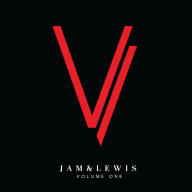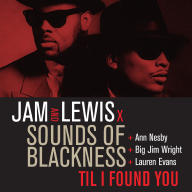Jimmy Jam (James Harris III) and Terry Lewis met as high schoolers in the Upward Bound program, and got their start in the late '70s as musicians, respectively on keyboards and bass, in the small Minneapolis club scene. Jam also worked as a club DJ. Either separately or together, the two played in the bands Wars of Armageddon, Mind Matter, and Flyte Tyme. The second of these three released an independent single, both sides of which Jam wrote, in 1977. The Time, launched in 1981 as the brainchild of Prince, grew out of Flyte Tyme, with the latter group's Jam, Lewis, Jellybean Johnson, and Monte Moir augmented by Morris Day, Jesse Johnson, and Jerome Benton. Over the next couple years, Jam Lewis performed and recorded with the Time, who pulled double duty as the backing band for touring partners Vanity 6. During breaks in activity, the two ventured into songwriting and production for other acts. Their first charting singles were notched in 1982 as the songwriters of the S.O.S. Band's "High Hopes" and as writers/producers of Klymaxx's "Wild Girls." These songs were released respectively on two of the most significant Black-owned labels of the era, Clarence Avant's Tabu and Dick Griffey's Solar. The latter linked Jam Lewis with visionary producer Leon Sylvers.
The next year, while working again with the S.O.S. Band in the group's native Atlanta, Jam Lewis' flight to a Time gig in San Antonio was grounded by inclement weather. Prince subsequently fined the moonlighting producers and kicked them out of the Time. The expulsion was for the better. By the end of 1983, Jam Lewis authored their first two Top Ten Black Singles hits, the S.O.S. Band's "Just Be Good to Me" and "Tell Me If You Still Care," and their first one that topped the chart, Cheryl Lynn's "Encore." Momentum continued to build over 1984 and 1985 with additional hits for S.O.S., Thelma Houston, Change, Patti Austin, Cherrelle, and another one of their Flyte Tyme bandmates, Alexander O'Neal. Consistently in the upper reaches of the Black Singles chart, Jam Lewis also cracked the Top 40 of the Hot 100 during this time with Cherrelle and O'Neal's "Saturday Love" and touched the Top Ten with their first of many hits for the big screen, "Tender Love" by Force M.D.'s (from Krush Groove).
Affiliations with Prince, Clarence Avant, and Leon Sylvers had all been crucial to Jam Lewis, but the partnership the duo established with Janet Jackson proved to be paramount. Before they met, the youngest of the Jackson siblings recorded two albums -- with some material produced by Sylvers and the Time's Jesse Johnson -- that had minor success. Jackson's name was on a list of prospective collaborators presented to Jam Lewis by AM label executive and former Sylvers musical director John McClain. Having already attained a vast array of hits that either ignited, sustained, or rejuvenated careers, Jam Lewis saw a unique opportunity in allying with Jackson, who was at major personal and professional crossroads. Over six weeks in 1985, Jackson created her artistic and mainstream breakthrough with Jam Lewis, Control, which in 1986 topped the Billboard 200 and spawned five Top Five pop singles, including the number one hit "When I Think of You." Jam Lewis produced two other albums released later that year, the S.O.S. Band's Sands of Time and the Human League's Crash, the unlikely latter the source of another number one pop hit, "Human," and won Producer of the Year at the Grammy awards ceremony the following February. The barrage of heavy-rotation singles continued with Alexander O'Neal, Morris Day, Herb Alpert, Cherrelle, and another act the duo helped to ease into adulthood, New Edition, whose Heart Break added to the stack of albums Jam Lewis produced in full and yielded the Top Ten single "If It Isn't Love." The decade was capped with Jackson's conceptual and wide-scoped Rhythm Nation 1814, another chart-topping, multi-platinum set. It trumped Control with seven Top Five singles highlighted by the number ones "Miss You Much," "Escapade," "Black Cat," and "Love Will Never Do (Without You)."
Rhythm Nation 1814 was still riding high into 1990, the year Jam Lewis scored additional Top Five pop hits with songs exemplifying their knack for tailoring material to strongly dissimilar artists (coincidentally, both singers were from New Edition): Ralph Tresvant's "Sensitivity" and Johnny Gill's "Rub You the Right Way." Additionally that year, Jam Lewis' reunion with the Time resulted in the Top Ten single "Jerk Out." Jam Lewis remained busy between sessions with Jackson. Most remarkably, they took their inclination to champion and nurture distinctive Minnesotan talent to another level by establishing their AM-distributed Perspective label. The long-running gospel group Sounds of Blackness, the young and versatile R&B band Mint Condition, and the vocal group Lo-Key? all had hits in 1991 and 1992. Jam Lewis' support ranged from production to steadfast promotion. At the same time, the two weren't averse to working with artists on other labels, even when it came to making the Perspective-issued soundtrack for Mo' Money. Jackson, Tresvant, Luther Vandross, and New Edition offshoot Bell Biv DeVoe were brought together for "The Best Things in Life Are Free," the platinum album's biggest single. Furthermore, the duo were enlisted around this time by Warner Bros. artist Karyn White, who had emerged as a solo artist a few years earlier beside their closest contemporaries, Babyface and L.A. Reid. Jam Lewis brought along members from all three of the ascending Perspective acts and worked on the majority of the singer's second LP, Ritual of Love, including the number one hit "Romantic."
In 1993, Jam Lewis were behind Johnny Gill's Provocative and a Perspective showcase for Lisa Keith, who had performed the lead on Herb Alpert's Top 40 Jam Lewis-produced single "Making Love in the Rain," and contributed background vocals to a plethora of the duo's other projects. The Gill and Keith efforts were preceded by the May release of Jam Lewis' extravagant and sensual third LP with Janet Jackson. At this point, Jackson's albums arrived like a spectacle, and Janet. followed through by topping the Billboard 200 and generating six Top Ten hits on the way to achieving worldwide sales that surpassed that of Control and Rhythm Nation 1814. Lead single "That's the Way Love Goes," one of its two chart-toppers, won that year's Grammy for Best Rhythm & Blues Song. Jam Lewis continued to expand their network and rack up hits over the ensuing few years. Above all, there was Boyz II Men's chart-topping "On Bended Knee," Jackson's Top Five "Runaway" (recorded for the Design of a Decade compilation), and Michael and Janet Jackson's "Scream" (off Michael's HIStory: Past, Present and Future, Book I). More sessions with Sounds of Blackness, Karyn White, and New Edition, connections (or re-connections) with legends such as Barry White, Patti LaBelle, Gladys Knight, and Lionel Richie, and the development of new talent at Perspective, such as the band Solo, also occurred across this 1994-1996 period.
Close work with the likes of Jon Secada, Patti LaBelle, and Mary J. Blige, as well as Boyz II Men -- specifically a second number one hit with the vocal group, "4 Seasons of Loneliness" -- reached shelves in 1997 before The Velvet Rope. Jam Lewis' fourth straight number one album with Janet Jackson was a provocative and norm-challenging set that birthed an equally successful single with "Together Again." Another four-year gap between Jackson albums ensued, but Jam Lewis remained prolific the whole time. They steered Jordan Knight to the Top Ten with his debut solo single "Give It to You" and crowned the chart with Mariah Carey's "Thank God I Found You" and Jackson's Nutty Professor II soundtrack cut "Doesn't Really Matter." Moreover, they strengthened their gospel ties with Yolanda Adams and contributed to TLC's FanMail -- two more collaborations that speak to their flexibility. Jackson's silky and livelier All for You landed in 2001 and continued her streak of number one Billboard 200 entries. The nostalgic title song, cleverly incorporating a sample from Change's Luther Vandross-fronted "The Glow of Love" (a hit four years before Change teamed with Jam Lewis on "Change of Heart"), topped the Hot 100 and won that year's Grammy for Best Dance Recording. Also in 2001, Jam Lewis were key to Usher's 8701, including "U Remind Me," their 15th number one pop single.
Recognition from the Recording Academy was routine for Jam Lewis throughout the 2000s. They had won Producer of the Year in 1986, were nominated in the same category four more times by the end of the '90s, and from 2000 through 2005 -- during which they moved their Flyte Tyme Studios from Minnesota to Los Angeles -- were nominated each year. Usher's diamond-platinum Confessions, Janet Jackson's Damita Jo, Gwen Stefani's Love.Angel.Music.Baby., and Mary J. Blige's The Breakthrough account for some of the bigger albums that Jam Lewis worked on in that period. Along with Yolanda Adams and Sounds of Blackness's James Big Jim Wright, they co-wrote Adams' "Be Blessed," the 2005 Grammy winner for Best Gospel Song. Their productions simultaneously were as wide-ranging as ever. Equally open to tipping their hats to influences (such as Kashif and Evelyn Champagne King, sampled on Jackson's "R&B Junkie") and banding together with those they inspired (like Dallas Austin, who produced Stefani's "Harajuku Girls" with them), they were similarly keen to help future solo superstars and legendary bands alike, from Beyoncé (the Fighting Temptations soundtrack) to Earth, Wind Fire ("Pure Gold"). In the decade's latter half, they played more with the past on Jackson's nostalgic 20 Y.O. and Chaka Khan's Funk This (a Grammy winner for Best R&B Album), and probably were the only common factors on LPs by the motley trio of Ruben Studdard, Jessica Simpson, and Ledisi.
In the first half of their fourth decade together, Jam Lewis weren't as high in profile, but they never seemed inactive, whether it was through El DeBarge's striking return with Second Chance, Usher's Raymond v. Raymond and Looking 4 Myself, or another assembly of the Time, under the name the Original 7ven, for Condensate. Jam Lewis and Bobby Ross Avila, a Perspective signee who had become one of the duo's most frequent session hands, also co-produced Sound the Alarm for Stax keyboard legend Booker T. Jones. Janet Jackson had made the 2008 album Discipline without Jam Lewis, but in 2015 the trio picked up where they left off with Unbreakable, their sixth number one album together. Jam Lewis through the remainder of the 2010s connected primarily with veteran artists such as Charlie Wilson, Peabo Bryson, and Johnny Gill. They were inducted into the Songwriters Hall of Fame in 2017, and shortly thereafter directed their energy toward making an album of their own. It had been in their minds as early as 1985, when a song intended for a headlining project was claimed by Janet Jackson and developed into "What Have You Done for Me Lately," the last song recorded for the career-changing Control. In 2021, 40 years after the Time's self-titled album, the partners released Jam Lewis, Volume One on their Flyte Tyme label. Morris Day, Sounds of Blackness, Boyz II Men, Mariah Carey, and Babyface were among the cast who, true to the Jam Lewis modus operandi, not only fronted the songs but also co-wrote them. ~ Andy Kellman, Rovi







